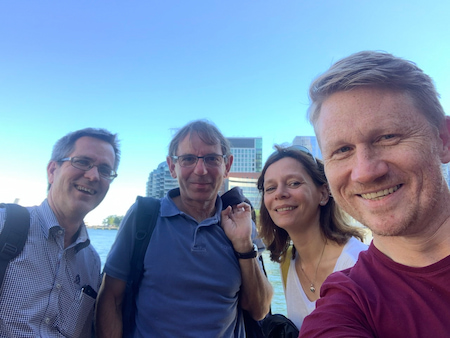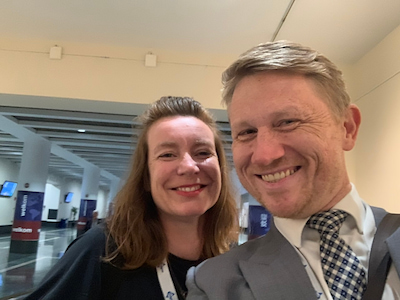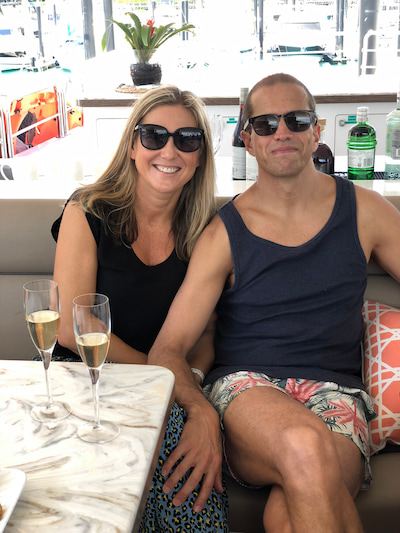New international trial for amyloidosis
In a first-ever Australian-French collaboration, an exciting new clinical trial, due to open before Christmas, will give Australians with relapsed or refractory AL amyloidosis access to a new drug combination.
It also asks an important scientific question – will the combination of a monoclonal antibody and an immunomodulatory agent work well together in AL amyloidosis? The trial’s Australian Principal Investigator, Dr Simon Gibbs, thinks it will.

This inaugural trial also potentially paves the way for future collaborations with the senior partner in the trial – Intergroup Francophone du Myelome (IFM) – a large collaborative haematological clinical research group that specialises in myeloma. Australia’s leading clinical trials group, the Australasian Leukaemia & Lymphoma Group (ALLG,) is leading the trial here, with vital funding provided by the Leukaemia Foundation.
The ALLG MM24 PISA study is Phase II, multi-centre, open label international trial using a combination of isatuximab, pomalidomide, and dexamethasone (IPd therapy). This combination has previously been used in a large Phase III study for relapsed/refractory myeloma and was approved for use with these patients.
MM24 gives patients access to potentially ground-breaking therapy
The MM24 trial will be run in Australia and France, at 15 trial sites across the two countries, including four here – at Box Hill Hospital, Eastern Health (Melbourne), Princess Alexandra Hospital (Brisbane), Fiona Stanley Hospital (Perth), and Royal Adelaide Hospital.
The aim is to recruit 46 patients to participate in the trial, including 12 Australian patients, and the recruitment period is 9-12 months.
“This is an opportunity for these patients to receive potentially ground-breaking therapy that’s not otherwise available,” said Dr Gibbs.
“Isatuximab is not currently available for either myeloma or AL amyloidosis in Australia, although the combination of pomalidomide and isatuximab has been studied in myeloma, with impressive results.
“In the amyloidosis setting, isatuximab has had very limited experience worldwide.
“We believe isatuximab, which is very similar to daratumumab, should have similar excellent activity and be well tolerated.
“Pomalidomide has been studied in amyloidosis and the feeling is that it is probably better tolerated than lenalidomide, which has been generally less well tolerated than some other classes of drugs for the treatment of AL amyloidosis,” he said.
Pomalidomide is a third generation immunomodulating agent (IMiD) and Dr Gibbs said combining it with a monoclonal antibody, like isatuximab, “is really exciting because it’s not really been studied before”.
“We believe it will be effective in AL amyloidosis with manageable side-effects.”
Treatment options are “quite limited” for patients who don’t have an adequate response to VCd chemotherapy (standard therapy).
“For first relapse or refractory disease, we cannot access pomalidomide, and for refractory disease, it’s very difficult to access daratumumab,” Dr Gibbs explained.
“This is an exciting study, particularly for patients who don’t achieve a good response to VCd, but who aren’t fit enough to get a stem cell transplant. This trial is a really attractive option for them.”
Dr Gibbs said around 24 AL amyloidosis patients were seen each year at the Victorian and Tasmanian Amyloidosis Service. He estimates that a quarter to a third of them are refractory, meaning “they don’t get the really deep responses that we want”, and a further “two or three patients per year relapse”.
Based on these figures and considering the AL patients across the rest of Australia, Dr Gibbs believes the 12 slots for the trial will be filled within 12 months.
“Most patients with AL amyloidosis would be eligible for this study if they have primary refractive disease and didn’t achieve a good response to their first treatment, or they have relapsed and require the next line of therapy,” he said.
Dr Gibbs said patients who have previously had daratumumab, isatuximab or pomalidomide are not eligible for this trial.
“We will have quite a number of patients who have been treated with VCd alone, without daratumumab, so this trial means they can access both pomalidomide and isatuximab.”

More about the ALLG MM24 PISA study
Dr Gibbs said the MM24 study was looking at decreasing the light chain burden – “the abnormal plasma cells that make the light chains that make the amyloid”.
“We’re cutting off the supply of the precursor proteins,” he said.
“Pomalidomide has a variety of mechanisms and one of the things it does is make the bed of the bone marrow hostile towards plasma cells, so it’s very difficult for those amyloid-causing plasma cells to propagate or reproduce.
“And isatuximab latches on to a surface protein of the amyloid-forming plasma cells, and it sends a signal to the immune system to clear those abnormal plasma cells. It’s very clever,” said Dr Gibbs.
This trial also will collect blood samples from trial participants.
“We’ll be doing extra sensitive techniques to see how good the responses have been and to look at some of the genetic changes,” said Dr Gibbs.
“We know that 50% of AL patients have a mutation called the t(11;14) translocation, so we want to see if there’s a difference in response between those who have that mutation and those who don’t.
“We’ll also be doing some very sensitive, specialised detection of light chains. Some of those samples will be sent to France for additional analysis, in addition to analysis at the Princess Alexandra Hospital in Brisbane and The Alfred in Melbourne.”
Dr Gibbs hopes to get results from the MM24 trial “quite quickly”.
“One of the issues is… how quickly can we achieve that deep clonal response to achieve improvement in organ function? We think that with the combination of pomalidomide and isatuximab you would hopefully go from a partial response to complete response within two cycles.
“That would certainly be our hope. That would be a very quick response.”
Patients will receive 12 cycles of treatment over 12 months, “unless there’s a complete response at the completion of nine cycles, or there’s disease progression, or unacceptable toxicity occurs”.
A discussion over lunch led to the MM24 trial
How the MM24 trial came about was “highly opportunistic”, as Dr Gibbs explains.

“The French originally came up with the idea, but we had a similar idea, and it was literally over some seafood and a glass of wine at the end of a conference, that we realised we had the same idea and agreed to work together.
“For some time, Peter Mollee and I had been talking about having a study that combined a monoclonal antibody with pomalidomide. We were very keen to explore various options and had come up with several proposals,” said Dr Gibbs.
“We were both at the International Myeloma Workshop in Boston, in September 2019; it was my last big overseas trip before COVID.
“We’d caught up with Murielle Roussel and Arnaud Jaccard [from IFM] and after the conference finished and before we caught our respective flights home, the four of us went out for lunch.
“We realised we both had the same idea with very similar proposals, so we came up with the idea of joining forces to do the trial together and were really excited by this prospect.”
It was a logistical challenge, however, dealing with two pharmaceutical companies and their franchises in two different countries and in two different languages.
“Through a lot of hard work, and I pay my respects to the staff at IFM and ALLG, as well as the French and Australian workers at Sanofi and BMS [Bristol Myers Squibb], it looks like we’re going to this idea become a reality, which is terrific for patients,” said Dr Gibbs.
He sees this trial as a pilot study “to see how well we play with the French, who we have extremely good relations with”.
“If we can demonstrate that the ALLG can work well with the French group, then I think this will really help cement a great relationship for future studies and to work together.”
Murielle Roussel, who worked with Dr Gibbs when he was in the UK, will be running the trial in France.
“She has visited Australia several times and is very familiar with the Australian treatment landscape and knows all the heads of the Amyloidosis Services within Australia, such as Peter Mollee, Fiona Kwok, and Hasib Sidiqi,” said Dr Gibbs.
“Murielle works with Professor Arnaud Jaccard, the international Principal Investigator, who we also know very well.
“They both have published extensively in the field of amyloidosis and are at the forefront of the use of monoclonal antibodies in AL amyloidosis.
“Murielle and Arnaud did the original study looking at daratumumab for relapsed AL amyloidosis in 40 patients that really demonstrated very nicely how well tolerated daratumumab is, and how effective it is, as recently published in the journal, Blood,” said Dr Gibbs.
“And it was the results of this French trial that led to the question of whether daratumumab could be brought into the first line, combined with VCd, paving the way for the ground-breaking ANDROMEDA trial.”
Delaine Smith, CEO Australasian Leukaemia & Lymphoma Group, said, “we’re proud at ALLG to be the organisation representing the haematologists bringing this important study, ALLG MM24, and others to Australia to the benefit of Australian amyloidosis patients”.
Funding support from the Leukaemia Foundation
“Unfortunately, AL amyloidosis is an under-recognised, under-appreciated disease, and those sorts of diseases don’t have a lot of money,” explained Dr Gibbs.
“We wouldn’t be able to conduct this trial without the support of the Leukemia Foundation, and this is a real testament to the dedication of the Leukemia Foundation to AL amyloidosis research in this country.
“We are incredibly grateful to the Leukemia Foundation’s donors and to the Leukemia Foundation too for awarding funding to our trial.”
The Leukaemia Foundation’s Head of Research and Blood Cancer Partnerships, Dr Peter Diamond said the Leukaemia Foundation was keen to support this clinical trial with funding of $250,000 over three years as part of the Trials Enabling Program.
“This trial will open in Australia thanks to the generosity of three extraordinary philanthropists each of whom has been touched by amyloidosis,” he said.
One of them is Jackie Haintz from the Rae and Peter Gunn Family Foundation. Jackie is a 46-year-old working mother of three who was diagnosed with amyloidosis five years ago.
She has since undergone four surgeries to assist with breathing and swallowing difficulties caused by the disease, and is now doing chemotherapy to hopefully slow the growth of the amyloid.
Jackie’s family felt moved to act after seeing very few clinical trials open to Australian patients.
“We were alarmed by the void of research being funded and undertaken in this field, despite the aspirations of brilliant Australian amyloidosis researchers and clinicians,” said Jackie.
“By supporting this international clinical trial, my family hopes to see more effective treatment options available for people living with amyloidosis. We also hope it inspires other families to support blood cancer research that will save and improve lives.”
Dr Diamond said MM24 is the first trial to bring together the expertise of the ALLG and the IFM.
“And it’s the first time AL amyloidosis patients who are relapsed or refractory will have access to a combination of pomalidomide and isatuximab; a treatment protocol not currently available to these patients in Australia.”
When the MM24 PISA amyloidosis trial opens
Dr Gibbs said the ALLG “was working round the clock to get this up and running as soon as we possibly can” and the hope is that the trial will open in late November or early December.
“We’re desperately trying to make sure that it is open in time to get our first patient on board before Christmas,” he said.
To find out more about the ALLG MM24 PISA trial, regardless of where in Australia you live, contact Dr Simon Gibbs by email: [email protected]
About AL amyloidosis
AL amyloidosis is a rare disease which is often missed or misdiagnosed. It is currently not captured in the national registries, so there is no robust national data on incidence or mortality. Data extrapolated from a Queensland study by the Australian Amyloidosis Network estimates that more than 300 people are diagnosed with AL amyloidosis each year in Australia. More than half of them are diagnosed in their 70s and the median overall survival for AL amyloidosis is 2.5 years, with a 5-year survival rate of 30%.
Last updated on January 3rd, 2023
Developed by the Leukaemia Foundation in consultation with people living with a blood cancer, Leukaemia Foundation support staff, haematology nursing staff and/or Australian clinical haematologists. This content is provided for information purposes only and we urge you to always seek advice from a registered health care professional for diagnosis, treatment and answers to your medical questions, including the suitability of a particular therapy, service, product or treatment in your circumstances. The Leukaemia Foundation shall not bear any liability for any person relying on the materials contained on this website.